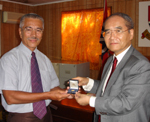The Director-General visits the Republic of Kiribati

- © UNESCO/A. Vohra
The Director-General of UNESCO, Mr Koïchiro Matsuura, undertook his first official visit to the Republic of Kiribati from 26 to 27 February.
Mr Matsuura is the first Director-General to visit the country since it became a Member of the Organization in 1989. Based on a 1995 realignment of the International Date Line, Kiribati is now the easternmost country in the world.
Upon his arrival in the country, the Director-General held talks with the President and Minister of Foreign Affairs and Immigration, Mr Anote Tong, whom he had already met in Beppu, Japan in December 2007 on the occasion of the First Asia-Pacific Water Summit. Given the importance of freshwater in Kiribati, Mr Matsuura detailed to the President the work undertaken by UNESCO in this area as lead Agency in the UN System. Mr Matsuura explained that the existing partnership between Kiribati and the Organization has been modest at the programmatic level, but there are many spheres in which this cooperation could be strengthened, particularly in the areas of education, culture and the sciences. UNESCO has already taken concrete steps to implement the Mauritius Strategy in order to strengthen its cooperation with the Pacific Island States. The UNESCO National Education Support Strategy (UNESS) which is to be validated by the Ministry of Education will identify the key areas in Education in which Kiribati would require international assistance. Based on those outcomes, UNESCO would be able to solidify its development cooperation with Kiribati in its areas of priority. The President informed Mr Matsuura that the Government was in the process of evaluating the results of its educational reforms, which he said were not too promising. UNESCO’s assistance particularly in the area of quality education would be of utmost importance.
In the area of culture, Mr Matsuura recalled that the Small Island territories of the Pacific are still one of the least represented regions on the World Heritage List. He said however, that some progress has been made in recent years to implement the World Heritage Convention especially through capacity building initiatives funded under the World Heritage fund and extrabudgetary resources in the framework of the World Heritage Pacific 2009 programme. In this regard, he congratulated the Kiribati Government for the ratification of the World Heritage Convention and for including the Phoenix Islands on the tentative list. The Director-General offered the Organization’s full support to work on the preparation of this site for inscription on the World Heritage List. He also pointed out that the majority of Small Pacific Island States’ cultural heritage is intangible – in the form of oral traditions and knowledge systems. In this regard, he said that the ratification of the Convention on the Safeguarding of the Intangible Heritage would greatly help the country preserve its oral cultural heritage.
Mr Matsuura also met with Ms Teima Onorio, Vice President and Minister of Commerce, Industry and Cooperatives; Mr Patrick Tatireta, Minister for Communications, Transport and Tourism Development; and Mr James Taon, Minister of Education.
In his discussions with the Ministers, the Director-General highlighted that UNESCO has continued to focus its work on assisting Pacific Island Member States in achieving quality Education for All by 2015 – through the development of each individual country’s education sector in partnership with other relevant UN agencies, Pacific regional organizations and civil society. Although Kiribati has achieved universal access and gender parity in Primary Education since 2005, the country is at risk of not being able to achieve the gender parity goal in secondary education by 2015. Furthermore, there is an urgent need to institute a systematic approach to assess progress whereby Kiribati may collect and use the data to monitor the advances of its education systems using Education for all (EFA) indicators and make evidence-based, informed policy decisions and recommendations. In this regard, Mr Matsuura said that in line with the findings of UNESS, UNESCO would assist in teacher training through the UNESCO Apia Office, with the mobilization of extrabudgetary funds.
During the visit, the Minister of Education hosted a reception in honour of the Director-General, which was attended by the President, numerous members of the Cabinet as well as representatives from other UN Agencies and the diplomatic corps. At this event, a cultural performance of the country’s rich traditional intangible heritage was staged in the form of dance and music. Mr Matsuura also attended a press conference in which the inscription of The Phoenix Islands on to the World Heritage List was discussed.
- Author(s):Office of the Spokeswoman
- Source:Flash Info N° 026-2008
- 28-02-2008

